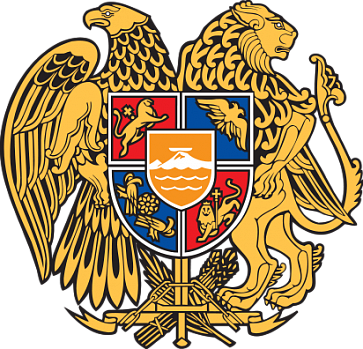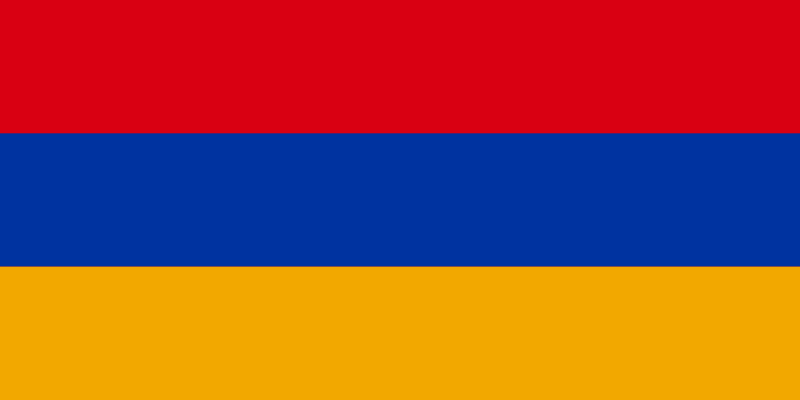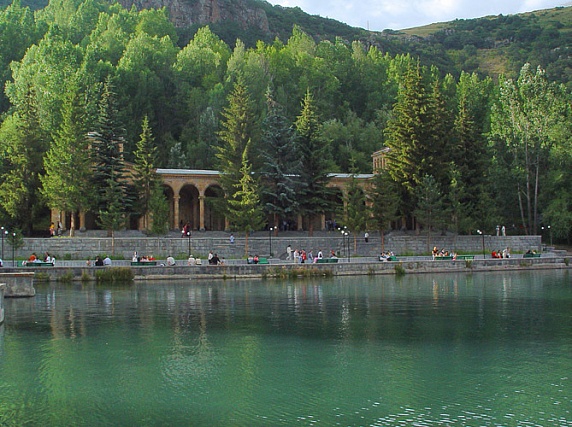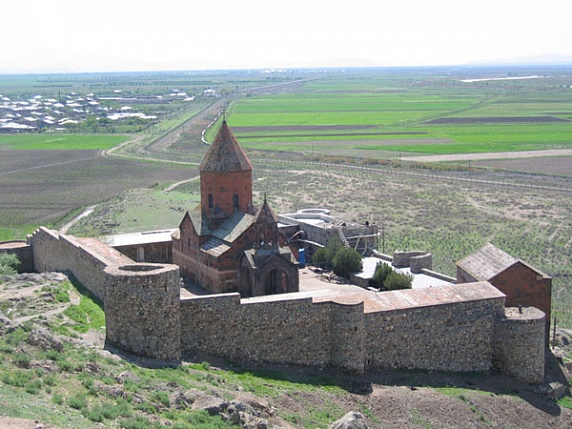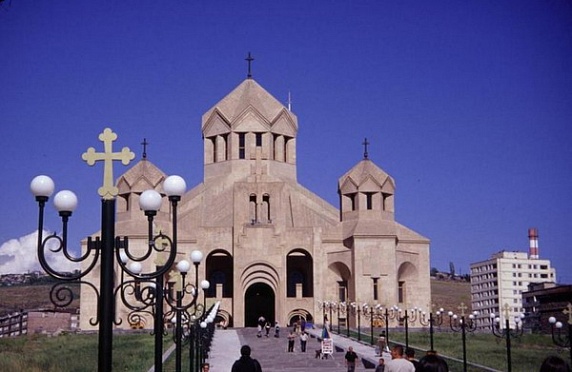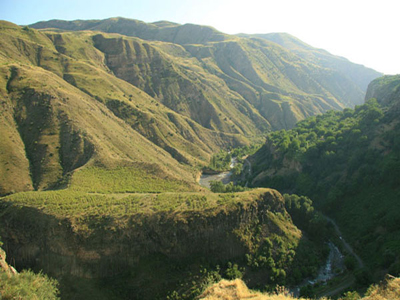 the Republic of Armenia
the Republic of Armenia
Foreign Minister Sergey Lavrov’s interview with the newspaper Argumenty i Fakty, Moscow, May 24, 2021
Question: Soon after President Joe Biden phoned President Vladimir Putin to suggest holding talks, Washington adopted new sanctions against Russia. Moreover, Joe Biden has not apologised to President Putin for calling him “a killer” in a televised interview. Is it possible to hold a personal meeting under these circumstances? Or should we wipe such offences under the table in the name of more important interests, such as the maintenance of global strategic stability?
Sergey Lavrov: An unhealthy situation has come about in Russian-US relations during the past few years. There are a number of major concerns. The Americans are currently conducting an openly unfriendly policy towards Russia, adopting sanctions and making unsubstantiated accusations and other hostile moves, including uncalled for public acts, such as the one you have just mentioned. Taken together, this has created a highly toxic environment hindering the development of a calm and professional dialogue between our countries.
For our part, we have always called for developing constructive and mutually beneficial cooperation with Washington and for removing the obstacles that are hindering our movement forward. History shows that even the most drastic differences can be settled when there is mutual striving for this.
Russia and the United States, the world’s two largest nuclear powers, bear special responsibility for strategic stability and international security. Without a full-scale Russian-US dialogue the international community will be hard put to deal with cross-border threats and challenges or settle regional conflicts. Incidentally, our international partners regularly point this out to us and to the Americans. Being aware of this, we are analysing Washington’s proposal to hold a meeting of our presidents in a European country this summer. During my meeting with US Secretary of State Antony Blinken held in Reykjavik on May 19, the American side demonstrated a constructive attitude, by and large, which is encouraging.
Question: What might the agenda be of the June summit, if it is held?
Sergey Lavrov: Preparing the agenda is part of the analysis of the American initiative to hold a summit meeting. Ultimately, our leaders themselves will decide what issues to discuss at their meeting.
Overall, I can tell you, just as President Vladimir Putin pointed out on numerous occasions, that we are willing to discuss and coordinate solutions to any topics on the bilateral agenda, as well as to work together to settle global problems and regional conflicts and crises. The main thing is for our dialogue to be based on the principles of equality, mutual respect and a balance of interests.
Question: Actually, there is no Russian ambassador in the United States or US ambassador in Russia. Did such a thing ever happen before? Can this fact be regarded as a new Cold War between our countries? What is Anatoly Antonov doing in Moscow, and will he return to Washington in the foreseeable future?
Sergey Lavrov: Recalling ambassadors for consultations is a common diplomatic move. It is an indication of dissatisfaction with the existing relations and a desire to thoroughly analyse them and possible scenarios of future developments. It does not mean that relations have been severed but shows that something has gone amiss in our relations, which should be analysed and rebooted.
As for Anatoly Antonov, he is having meetings not only at the Foreign Ministry, but also at the Presidential Executive Office, the State Duma and other Russian agencies. So far, we believe that our ambassador, just as the head of the US diplomatic mission in Moscow, John Sullivan, will be working in their capitals for a while.
Question: During your interview with Argumenty i Fakty last year, you said that you were hopeful that a summit of the five nuclear countries would be held as soon as possible. Is this proposal still on the table? Incidentally, does the extension of the New START mean that the system of nuclear arms control will not be ruined after all and that one can do business with the Biden administration in this field?
Sergey Lavrov: Our proposal to convene a summit of the UN Security Council’s five permanent members holds good. The coronavirus pandemic prevented us from coming together last year, but it has not destroyed the general idea and we continue preparing for this meeting. We hope that the summit will be held as soon as the epidemiological situation returns back to normal throughout the world.
We regard the agreement of Joe Biden’s team to extend the New START without any preconditions and linkages as an encouraging sign. The fact that we have ultimately extended the treaty is fully in keeping with the security interests of both countries and the international community as a whole.
I will not try to guess what turn the developments may take. It is apparent to us that joint moves to improve the situation in the field of strategic stability are badly needed in the current complicated conditions.
We welcome the US side’s agreement to see the extension of the New START as the starting point for launching a new stage of a bilateral dialogue on strategic armaments. We are ready for substantive work and are fully aware of the complexity and unusual nature of the problems that have accumulated in this field.
Question: Experts are interpreting the accumulation of troops around Donbass in April as a risk of a new dangerous escalation and are even comparing the situation with the 1962 Cuban missile crisis. Can a conflict between Russia and Ukraine (another aggravation is possible any day) really detonate a third world war?
Sergey Lavrov: First of all, I would like to point out that the conflict in Donbass is an internal Ukrainian armed conflict. It is a consequence of the coup d’etat that brought radical nationalist forces to power in Kiev.
Ukrainian radicals and nationalists started enforcing their rules and cracking down on those who rejected them, including the Donbass residents who are simply protecting their freedom, national and cultural identity and the right to speak their native language.
The Ukrainian authorities refuse to recognise their legitimate interests or to grant a special status to Donbass, as stipulated in the Minsk agreements. Instead, Kiev is trying to lay the blame on Russia and present it as a party to the conflict, demanding the adoption of tougher anti-Russia sanctions.
The planned military exercises of the Russian armed forces are held every year, concluding the winter-spring period of combat training. They are held on Russian territory a considerable distance away from Donbass. It is these exercises, which have already ended, that Kiev, supported by Western countries, tried to present as an aggravation of tension.
I would like to use this occasion to point out the military build-up of the United States and its NATO allies in Ukraine and the Black Sea. They are sending weapons and providing financial and material assistance to the Ukrainian army, as well as teaching the Ukrainian military the NATO methods of warfare. Seven joint military exercises with NATO countries are to be held in Ukraine in 2021 alone. In other words, military drills will be held there every six to eight weeks. Ukrainian troops are taking part in the large-scale NATO exercise Defender Europe 2021. Russia has to take all of this into account in its military planning. And lastly, needless to say, that the militarisation of Ukraine is not facilitating a settlement of the conflict in Donbass.
Question: Kiev has been speaking increasingly more often about revising the Minsk agreements. How would you explain this position, and what can be done if Ukraine does not want to implement these agreements? Is there any way out of this deadlock?
Sergey Lavrov: Indeed, Kiev has been talking about this increasingly more often. President Vladimir Zelensky has stated recently that “the Minsk agreements are needed not to settle the conflict, but to preserve sanctions against Russia.” The head of the Ukrainian delegation at the Trilateral Contact Group, Leonid Kravchuk, said that the Minsk agreements are a [political] millstone round Ukraine’s neck and one of the obstacles that is preventing the settlement of the conflict. These statements cannot be assessed as anything other than refusal to implement the Minsk Package.
The reason for this is only too obvious. The Kiev authorities’ rating is going down and down, and the “peace in Donbass” promised by Zelensky is nowhere in view.
It appears that Kiev believes that the granting of a special status to the separate districts of the Donetsk and Lugansk regions as component parts of the Ukrainian state, which is a key factor of the Minsk agreements, will hinder the implementation of the current Ukrainian policy, a policy of far-right nationalism, Russophobia, enforced Ukrainisation, the suppression of independent media outlets, the persecution of dissenters and severance of centuries-old ties between our nations.
There is also an explanation for Kiev’s stubborn desire to change the sequence of the implementation of the Minsk package by placing the entire length of the Russian-Ukrainian border under Ukrainian control before holding local elections in Donbass. They are not even trying to keep secret their subsequent plans, which provide for the filtration of the population and the internment of the “politically unreliable” people in concentration camps.
Needless to say, the Donbass residents are not enthusiastic about this possibility. The people there have to live amid the horrors of bombing raids and shooting by the Ukrainian armed forces and are suffering untold hardships because of Kiev’s economic blockade.
To find a way out of this dead-end, the Kiev authorities must decide if they want Donbass to be reintegrated into Ukraine. If they do, the only way towards this goal is strict and consecutive implementation of the Minsk package. I would like to remind you that this document has been approved in a UN Security Council resolution and is thus binding on the conflicting sides, which are Kiev, Donetsk and Lugansk.
Question: Russia’s top negotiator on Donbass, Dmitry Kozak, has made a surprise proposal, suggesting that the talks are held publicly so that the positions of the sides are clear to everyone. I can’t remember anything quite like this in the history of diplomacy. How would such openness influence the talks? Why are talks usually held behind closed doors, rather than in the form of public debates, for example?
Sergey Lavrov: Ensuring the confidentiality of talks is the usual diplomatic practice and a prerequisite of success. But this rule is only effective when all the sides work honestly towards practical results.
Regrettably, the conduct of the Ukrainian delegation at the OSCE- and Russia-assisted talks held at the Contact Group between Kiev, Donetsk and Lugansk tells a different story. This also largely concerns the discussions held by the political advisers of the Normandy Four. This is the reason why Dmitry Kozak has come up with the proposal you just mentioned.
It is notable that the Kiev authorities are carefully camouflaging their destructive line at the talks, a line that runs contrary to the Ukrainians’ aspirations for restoring peace in Donbass. Seeking to deceive the general public, Kiev is deliberately distorting the outcome of the talks and the actual approaches of the participants both within the framework of the Contact Group and in the Normandy format. In other words, this is a case of deliberate and purposeful disinformation.
Here is a concrete example. On June 22, 2020, the participants of the Trilateral Contact Group coordinated and signed a document on additional measures to strengthen the ceasefire. The sides pledged to make public statements about the issuance of the relevant orders and confirm that these ceasefire orders comply with such measures.
The self-defence forces implemented this obligation almost immediately. As for Kiev, it took eight months of hard work, primarily by Russia within the framework of the Normandy format, to ensure that these statements are posted on the website of the Ukrainian Defence Ministry in full and without any alterations.
Should the facts of this thimble-rigging, which are quite numerous, be left unanswered? I have no doubt that the Ukrainian public must know who its “heroes” are. How will the ordinary Ukrainians draw correct conclusions about the developments in their country otherwise?
Question: You have mentioned the possibility of breaking off ties with the EU, which are barely alive anyway. Under what conditions would Russia be willing to again develop these relations? Is it the lifting of the sanctions, the removal of pressure over human rights issues, including the Navalny case, or something else?
Sergey Lavrov: Indeed, I have mentioned several times that our relations with the EU have been reduced to a minimum. In 2014, Brussels, acting under US pressure, as the Americans themselves admitted openly, destroyed the architecture of cooperation which took two decades to create.
This was not our choice. Moreover, we have always tried consistently to steer the EU towards mutually beneficial cooperation in areas of mutual interest. Regrettably, EU bureaucrats have shelved many of our proposals.
The EU’s policy of containing Russia is growing stronger. There is direct interference in our internal affairs, for example, when it comes to the situation around Alexey Navalny. Unilateral sanctions against Russian individuals and legal entities are being expanded. More and more unsubstantiated allegations are levelled against us.
The latest example is the new triad of EU principles in relations with Russia. The priority has been given to pushback and containment, while the third principle, engagement, has been limited exclusively to subjects of interest to the EU. One wonders if Brussels really hopes to overcome the deadlock in our relations through this openly confrontational approach. Our colleagues should know that we will not accept these one-sided games. Russia will not be intimidated by sanctions or threats. If necessary, we will continue to respond to provocations and unfriendly moves harshly but proportionately.
At the same time, I would like to point out that we are still interested in dealing with the EU and its member states in the spirit of pragmatism and mutual respect based on the universally recognised norms of international law. It is on the basis of these principles that we are successfully developing relations with the overwhelming majority of states in Eurasia, Africa and Latin America. I am sure that a great deal can also be achieved in cooperation with our European neighbours.
Question: Western media outlets have reported that the approval of the Sputnik V vaccine by the European Medicines Agency has been put in question, allegedly because the regulator has higher criteria than Moscow expected. Is this so? Considering that many countries only allow entry to vaccinated travellers, does this mean that Russians will be unable to travel to the EU because our vaccine has not been approved in Brussels?
Sergey Lavrov: The Russian Sputnik V vaccine has passed the stage of scientific advice from the European Medicines Agency (EMA), which has started a rolling review of the vaccine.
We believe that this matter should be considered from an exclusively professional and depoliticised standpoint. It concerns the health and life of the people. The main thing is for the EU to be guided by these considerations at all the subsequent stages of considering Russia’s application.
I would like to remind you that to date Sputnik V has been registered in over 60 countries. That figure is self-explanatory. Our vaccine is trusted throughout the world.
As for reopening countries to travellers, there is a proposal to use Digital Green Certificates, which would include proof that a person has been vaccinated against COVID-19, received a negative test result, or recovered from COVID-19. So far, this idea is aimed at restoring travel within the EU. The issue of European certificates’ compatibility with similar documents or digital certificates used in third countries is being discussed.
The European Commission has also proposed simplifying the entry of vaccinated travellers from third countries, but only if they have been inoculated with vaccines approved by the EMA or WHO (the latter is currently evaluating Sputnik V for certification purposes). Ultimately, the EU states themselves will decide whether to allow tourists from third countries. Many of them have a strong interest in reopening their borders to Russian tourists.
It should be said that the epidemiological situation remains volatile in many European countries. For our part, we would like to remind our EU colleagues that their decisions should be non-discriminatory and should also take into account all the COVID-19 vaccines created in non-Western countries.
Question: It appears that US troops are finally leaving Afghanistan. However, there’s a risk that once they leave the country, the Taliban will again go for a power grab. Does this represent a threat to Russia?
Sergei Lavrov: Russia stands ready for any turn developments in Afghanistan may take. Of course, we are interested in a stable situation there. To this end, alongside other countries, we are energetically promoting the process of national reconciliation. Specifically, we are doing this as part of the expanded troika with Russia, the United States, China and Pakistan. We plan to step up the Moscow format activities going forward, which includes all countries in the region and the United States.
Concerns about the Taliban seizing power are coming primarily from Western observers. However, first, the Taliban themselves are saying they have no such intentions, and second, there are political forces in Afghanistan which clearly will not be supportive of the Taliban coming to power through violence.
In our contacts, we are making clear to the Taliban movement that we are against them monopolising power. There is a need to form a government that will take into account the interests of all ethnic and political groups in Afghan society if we want to achieve a sustainable settlement.
The months ahead may be decisive in this regard. The forecasts are telling us that they may see another surge in seasonal combat activities. Much will depend on the willingness of the warring Afghan parties to conduct a constructive dialogue and to agree on key issues of a future state structure.
Question: President Erdogan recently welcomed President Zelensky to Istanbul. The Turks have once again pointed out that they do not recognise Crimea as part of Russia. They are supplying weapons to Ukraine, including UAVs, one of which has allegedly killed a six-year-old boy in Donbass. Turkey was a country that stoked the fire of war in Nagorno-Karabakh. We also remember the downed Russian aircraft in Syria. Aren’t our “Turkish partners” allowing themselves a bit too much?
Sergey Lavrov: Indeed, Russia and Turkey have major differences with regard to a number of international issues. However, this does not prevent us from maintaining a productive political dialogue with our Turkish partners and developing mutually beneficial cooperation across various spheres ranging from energy to tourism. Let’s also not forget that as a NATO country, Turkey, despite heavy pressure from Washington, has not only become interested in buying advanced military equipment from Russia, but has already implemented a major contract for purchasing modern S-400 Triumph air defence system.
Regarding Ukraine, we strongly encourage our Turkish colleagues at all levels to analyse the situation in depth and to stop feeding Kiev's militaristic sentiment. We’ve been very clear that leniency towards Ukraine’s aggressive initiatives in Crimea is tantamount to an encroachment on Russia’s territorial integrity. We hope that Ankara will adjust its approach to accommodate our legitimate concerns.
As a follow-up to the developments in Syria, it is important to note that a highly viable mechanism for overcoming the crisis has been created thanks to agreements with Ankara, both bilaterally and as part of the Astana Troika with Iran. The situation on the ground, including on yesterday's battlefields, has stabilised, and attempts to reignite hotbeds of international terrorism have been suppressed, including through our joint efforts. In addition, Russia, Turkey and Iran managed to consolidate various layers of Syrian society and organise efforts to build the future political structure of the country in a Constitutional Committee based format.
A joint Russia-Turkey centre to control the ceasefire and hostilities has been operating in the Nagorno-Karabakh conflict area since January 30. This centre uses exclusively visual observation to monitor possible violations.
So, without downplaying existing differences, we will continue to be guided by the strategic vision of our common interests in expanding cooperation with Turkey. I am confident this meets the aspirations of the Russian and the Turkish peoples.
Question: Has Russia succeeded in keeping warm relations with Armenia despite the unfavourable outcome of the armed conflict in Karabakh?
Sergey Lavrov: Russian-Armenian relations have been tested by time. I have no doubt that they will continue developing in the spirit of mutual trust, strategic partnership and allied interaction.
This country is always ready to give a hand to the fraternal Armenian people, as testified by the mediating efforts of Russia and personally from President Vladimir Putin, thanks to which it became possible to achieve an end to the military confrontation in Nagorno-Karabakh in the autumn of 2020 and to launch the process of normalisation in the region.
Today, we can say that the trilateral agreements reached by the leaders of Azerbaijan, Armenia and Russia and put on record in their statements of November 9, 2020, and January 11, 2021, are generally being implemented successfully. This refers, among other things, to removing the humanitarian and socioeconomic consequences of the conflict and unlocking transport and economic ties in the South Caucasus. Russian assistance is being praised by our Armenian friends.
It is also important to understand that Russia-Armenia relations are not limited only to the Nagorno-Karabakh issues. We have established an unprecedentedly active and trust-based political dialogue at the top and other levels. This year alone, our leaders met on two occasions and had numerous telephone conversations. In early May, I paid a visit to Yerevan. Inter-parliamentary exchanges are in progress.
To help overcome the consequences of the COVID-19 pandemic, Russia has supplied to Armenia several dozen thousand doses of the Sputnik V vaccine. We are studying how to expand our assistance. We are promoting successfully our trade and economic ties, something that is being helped by the regular meetings between the co-chairs of the Russian-Armenian Intergovernmental Commission on Economic Cooperation.
Question: What do you think about preparations for an attempt on the life of Alexander Lukashenko, something Minsk has accused US secret services of? Given that the protests in Belarus have subsided, could other instruments to change the regime in the country be used? What assistance is Moscow ready to give its ally in this context?
Sergey Lavrov: An attempt to stage an armed coup in Belarus with help from a US citizen is part of the Western line towards interfering in the internal affairs of post-Soviet countries, which uses a range of methods of “colour revolutions.” It is hard to imagine that such actions could be organised without the knowledge of US secret services. It is reminiscent of the coup in Ukraine in February 2014.
Alexander Lukashenko had to take an extraordinary step because of the threat to his life. On May 9, he signed a presidential decree to the effect that in an emergency, power in the country would be transferred to the Security Council.
You are right that the situation in Belarus has generally stabilised. Despite unprecedented support from the outside, the émigré supported opposition fails to stir up the situation. Most people are tired of street disorders and realise that this is counterproductive.
Despite this, the Western countries are intensifying their pressure on Minsk while promising extravagant economic aid in exchange for “a transition to democracy.” They have sunk to the point of intimidating the Belarusian government and other law enforcement personnel with prosecution under international law.
At the same time, large-scale media, political and financial support for the Belarusian émigré opposition continues.
We can assume that Belarus’s “well-wishers” will not stop at that. We are concerned about yet another appeal by Svetlana Tikhanovskaya to mobilise protests in August and September this year. We hope the Belarusian people will display their inherent wisdom and will not follow in the wake of those who are trying to use the situation for their selfish interests.
Naturally, Russia will not leave Belarus in trouble. We are always ready to help our neighbour and strategic ally. After all, our relations are based on fraternal, often family-like interaction, a common history and spiritual values.
Question: China and Russia are on the same side of the barricade in countering the United States. Could Moscow and Beijing strike an alliance in this context, probably, even a military-political union?
Sergey Lavrov: Russia-China relations are developing rapidly. Today they are at the highest point in their history largely because the existing model of bilateral ties is superior to some extent to the level of interstate cooperation of the unions formed during the Cold War.
The fundamental principles of our relations are laid down in the Treaty of Good-Neighbourly Relations, Friendship and Cooperation. In July we will observe the 20th anniversary of this treaty.
Today, both our Chinese partners and we are satisfied with the existing format of cooperation. It allows us to resolve any, even the most difficult issues, in a bilateral dialogue, effectively uphold our interests in multilateral associations and coordinate our approaches in the world arena. By working together, Russia and China are exerting a positive, stabilising influence on the global and regional situation.
Of course, the world situation is changing rapidly. My friend and colleague, Foreign Minister of the PRC Wang Yi emphasised in his recent interview with the Xinhua news agency that Russia-China cooperation does not have a final ending point, taboo issues or an upper limit. I agree with his assessment.

